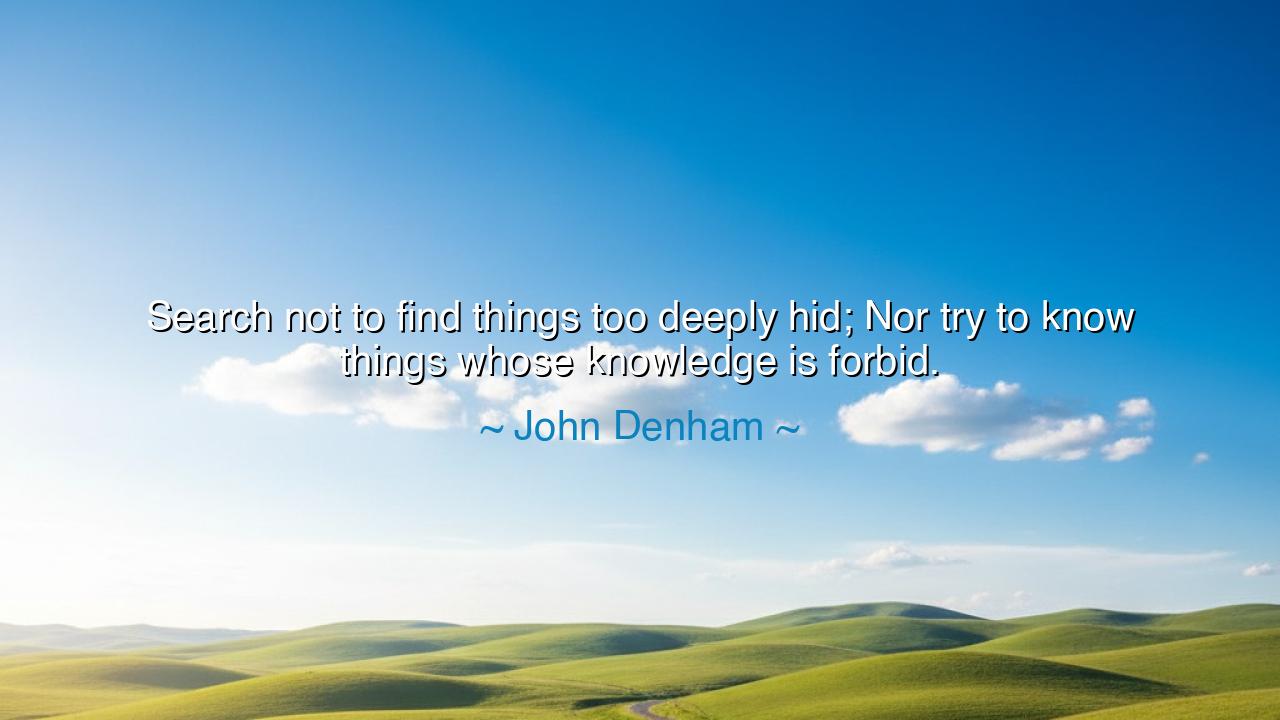
Search not to find things too deeply hid; Nor try to know things
Search not to find things too deeply hid; Nor try to know things whose knowledge is forbid.






The poet and philosopher John Denham, a man of the seventeenth century who lived amidst the dawn of modern science and the turmoil of human pride, once wrote with sober clarity: “Search not to find things too deeply hid; nor try to know things whose knowledge is forbid.” These words, drawn from his poem Cooper’s Hill, are not the mutterings of fear or ignorance, but the wisdom of restraint—the acknowledgment that not all mysteries are meant for human hands, nor all truths ready for human hearts. In an age of relentless curiosity, when men sought to master heaven itself, Denham’s voice rose like that of an elder sage, reminding humanity that the thirst for knowledge, though noble, must be tempered with reverence.
The origin of this quote lies in a time when the world was changing swiftly. The scientific revolution was breaking the chains of superstition, unveiling the mechanics of creation, and challenging the old boundaries of faith and reason. Denham, a poet of balance and measure, saw the danger that can arise when curiosity loses humility. His warning echoes the ancient tale of Prometheus, who stole fire from the gods to gift it to mankind, bringing both enlightenment and torment. To “search not too deeply” is not to forbid inquiry, but to remind the seeker that knowledge is a sacred flame—it gives light, but it can also burn.
Throughout history, humanity has been both blessed and burdened by its desire to know all things. The story of Adam and Eve in the Garden of Eden is the first and timeless example of this truth. The Tree of Knowledge promised wisdom like the gods, yet in tasting its fruit, humankind fell into suffering and mortality. Denham’s words carry the same warning: that there exists a boundary—not of oppression, but of mercy—beyond which the soul may lose its peace. There are truths that require preparation, knowledge that demands purity, and mysteries whose unveiling too soon brings ruin instead of revelation.
But Denham does not preach ignorance; rather, he preaches balance. For it is not wrong to seek understanding—it is wrong to seek it without wisdom. The knowledge that is forbid is not forbidden because it is evil in itself, but because the mind that grasps it may not yet be ready to wield it rightly. In every age, mankind’s ambition races ahead of its conscience. We split the atom before learning to live without hatred; we uncover the code of life before learning to honor its sanctity. And so Denham’s ancient counsel rings truer now than ever: to seek knowledge, yes—but to do so with awe, humility, and a heart aligned with virtue.
Consider the tale of Doctor Faustus, the scholar who, unsatisfied with earthly learning, turned to forbidden arts to gain ultimate knowledge and power. His soul, driven by pride, entered a pact with the devil, and though he gained understanding beyond mortal measure, he lost his peace and perished in despair. His story, born of legend, mirrors the warning of Denham’s verse: that the quest for mastery without moral grounding leads not to enlightenment, but to ruin. The light of wisdom is meant to illuminate the path, not to blind the traveler.
O seeker, take heed: there is a difference between the hunger for truth and the hunger for dominion. The first ennobles the soul; the second corrupts it. True knowledge is not seized—it is received. It unfolds gently before those who seek with purity of purpose. Denham’s counsel teaches that one must learn not only how to know, but also when to stop. For in knowing when to pause, one shows mastery over oneself—and that is the highest form of wisdom.
Thus, the lesson of John Denham’s words is not to shun inquiry, but to sanctify it. Let your search for truth be guided by reverence; let your discoveries serve goodness, not pride. There will always be mysteries that lie beyond reach—the origins of the soul, the final destiny of creation, the secret mind of God. To stand before such mysteries in wonder, without the arrogance to dissect them, is not weakness but strength. For the wise understand that some knowledge is not meant to be conquered, but contemplated.
So, children of tomorrow, remember: to know is powerful, but to know when not to know is divine. Seek the truths that uplift, not those that consume. Let your curiosity be the flame that warms, not the fire that destroys. And walk, as Denham counseled, with both eyes open—one upon the world’s mysteries, and the other upon your own heart—lest in your quest to know all things, you forget the greatest truth of all: that wisdom begins where pride ends.






AAdministratorAdministrator
Welcome, honored guests. Please leave a comment, we will respond soon